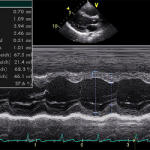The ability to accurately perform a standard ECG interpretation is the most fundamental task that anyone working in cardiac care must master. A 12-lead electrocardiogram provides an image of heart functionality and is essential to the process of identifying an abnormality in the rate and rhythm. Those who plan to work in the medical field, as an EKG technician, will spend the majority of their time administering electrocardiograms and might be expected to assess both the exam quality and differentiate between normal and abnormal results.
Waves and Intervals
Proper ECG interpretation requires a basic understanding of the different elements found on a tracing. Every ECG consists of a series of waves and intervals that represent electrical current as it flows through the heart and initiates contractions within the cardiac cells. The ‘P wave’ is seen first on the tracing and it represents the depolarization of the right and left atria. The atria are … Click Here to Continue Reading

The echocardiogram is a procedure that uses sound waves to create images of the heart. To collect these images, the technician places an instrument called a transducer on the chest of the patient. The transducer emits waves that penetrate the body and get reflected back. As the transducer receives the reflected waves, it transmits them to a computer where they are converted into moving images. Physicians use the echocardiogram images with other studies to evaluate the heart and determine whether or not any abnormalities exist.
Transthoracic Echocardiogram
There are a few different types of echocardiograms that can be used to evaluate the heart. A transthoracic echocardiogram is a common approach because it is easy to perform and usually does not cause discomfort. To perform a transthoracic echocardiogram, a technician places the transducer on the chest and adjusts it so a high quality image can be captured. Cardiologists often use this type of echo … Click Here to Continue Reading
The electrocardiogram technician is someone who administers the electrocardiogram (EKG). This procedure is used to evaluate the heart’s electrical activity and to identify irregularities. Similar to other medical providers, technicians working in this profession are often required to pass a nationally recognized certifying exam as a condition of employment. Certification is important because it demonstrates that an EKG technician has met common standards of competence and is able to provide the highest level of care possible.
There are a handful of EKG Certification options available to individuals who plan to pursue a career as a technician in this specialty area. Before deciding on an exam, it is important for technicians to contact potential employers about the certification option that they require. There is nothing more frustrating than investing the time and effort in obtaining credentials that do not meet the standards adopted by the facility where a technician is seeking employment. Taking time … Click Here to Continue Reading





